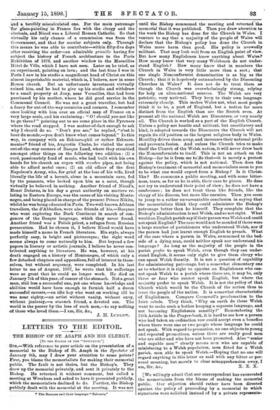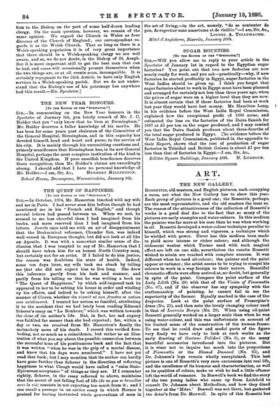LETTERS TO THE EDITOR.
• THE BISHOP OF ST. ASAPH AND HIS CLERGY.
[TO THR EDITOR OF THE " SPRCILTOR."]
Slit,—With reference to your article on the presentation of a Memorial to the Bishop of St. Asaph in the Spectator of January 8th, may I draw your attention to some points P First, you blame the memorialists for making their memorial public. The fault is not theirs, but the Bishop's. They drew up the memorial privately, and sent it privately to the Bishop. He returned it without comment, but called a meeting at Wrexham and asked to have it presented publicly, which the memorialists declined to do. Farther, the Bishop publicly dealt with the memorial at the meeting. It was not
• The Basque call their language " Beltuara."
until the Bishop summoned the meeting and returned, the memorial that it was published. Then you draw attention to the work the Bishop has done for the Church in Wales. I venture to say that a majority of the people of Wales will declare that the Bishop's policy has done the Church in Wales more harm than good. His policy is avowedly militant. That may look well from an English point of view. But how many Englishmen know anything shoat Wales? How many know that very many Welshmen do not under- stand English? How many know that in numbers the Church in Wales is very little more than a sect ; that one single Nonconformist denomination is as big as the Church; that it is hopelessly outnumbered by the Dissenting Churches in Wales? It does not do to treat them as though the Church was overwhelmingly strong, relying for help on ultra-national sources. The Welsh are very patriotic, very national. They keep to their own language extremely closely. This makes Wales not, what most people think it to be, a part of England, but a nation far more distinct from the English than are the Scotch even. At present all the national Welsh are Dissenters, or very nearly alL The Church is worked as a part of the English Church. Unless a policy not hostile and militant, but conciliatory and kind, is adopted towards the Dissenters the Church will not regain its old position as the largest religious body in Wales. Hostility drives them away, and increases their national pride and prevents fusion. And unless the Church tries to make itself the Church of the Welsh nation, it will never draw back the Nonconformists to itself. This is not an attack on the Bishop—far be it from me to:do that—it is merely a protest against the policy, which is not national. Then does the Bishop's treatment of memorial and memorialists seem to you to be what one would expect from a Bishop P Is it Christ.. like ? He summons a public meeting, and with some bitter- ness, tears, as far as he is able, their case to pieces. He does not try to understand their point of view; he does not have a conference ; he does not treat them like friends, like the clergy of his diocese, but more like enemies. Then you seem to jump to a rather unwarrantable conclusion in saying that the memorialists think they could administer the Bishop's patronage better than he himself. They complain that the Bishop's administration is not Welsh, and so not right. What would an English parish say if their parson was Welshand could not speak English F The case would not be mended if there were a large number of parishioners who understood Welsh, nor if the parson had just learnt enough English to preach. What of the case where a. parson in Wales, summoned to the bed- side of a dying man, could neither speak nor understand his language ? As long as the majority of the people in the parish prefer to speak Welsh, even though they can under- stand English, it seems only right to give them clergy who can speak Welsh fluently. It is not a question of capability for administering patronage, but a somewhat elementary one as to whether it is right to appoint an Englishman who can- not speak Welsh to a parish where there are, it may be, only three or four who cannot speak English, but where the majority prefer to speak Welsh. It is not the polioy of that Church which would be the Church of the nation thus to treat the people of the nation. It is somewhat characteristic of Englishmen. Compare Cromwell's proclamation to the Irish rebels. They think, Why on earth do these Welsh want to make such a bother keeping a separate language, and not becoming Englishmen sensibly?' Remembering the 24th Article in the Prayer-laook, it is hard to see how a person who had taken an ordination vow could accept even a benefice where there were one or two people whose language he could not speak. With regard to promotion, no one objects to young and repeated promotions, unless there are really good men who are older and who have not been promoted. Also "senior and capable men" clearly means men who are capable of ministering to a Welsh population, men fitted for a Welsh parish, men able to speak Welsh.—Hoping that no one will regard anything in this letter as said with any bitter or per- sonal meaning, but merely to clear misapprehension away, I
[We willingly admit that our correspondent has exonerated the memorialists from the blame of making the memorial public. Oar objection should rather have been directed against the policy of proceeding by a memorial to which signatures were solicited instead of by a private represents- tion to the Bishop on the part of some half-dozen leading clergy. On the main question, however, we remain of the same opinion. We regard the Church in Wales as four dioceses of the Church of England ; our correspondent re- gards it as the Welsh Church. That so long as there is a Welsh-speaking population it is of very great importance that there should be a Welsh-speaking clergy we are well aware, and so, we do not doubt, is the Bishop of St. Asaph. But it is more important still to get the best man that can be had, and cases will occasionally present themselves when the two things are, or at all events seem, incompatible. It is certainly repugnant to the 24th Article to have only English services in a Welsh-speaking parish. But we do not under- stand that the Bishop's use of his patronage has anywhere had this result.—En. Spectator.]



































 Previous page
Previous page